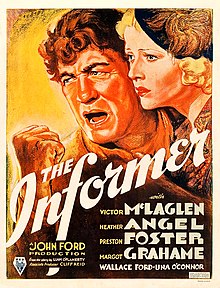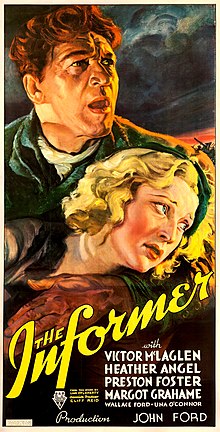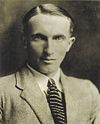
Maximilian Raoul Steiner was an Austrian composer and conductor who emigrated to America and became one of Hollywood's greatest musical composers.

Victor Andrew de Bier Everleigh McLaglen was a British-American actor and boxer. His film career spanned from the early 1920’s through the 1950’s, initially as a leading man, though he was better known for his character acting. He was a well-known member of John Ford’s Stock Company, appearing in 12 of the director’s films, seven of which co-starred John Wayne.

The Quiet Man is a 1952 American romantic comedy-drama film directed and produced by John Ford, and starring John Wayne, Maureen O'Hara, Victor McLaglen, Barry Fitzgerald, and Ward Bond. The screenplay by Frank S. Nugent was based on a 1933 Saturday Evening Post short story of the same name by Irish author Maurice Walsh, later published as part of a collection titled The Green Rushes. The film features Winton Hoch's lush photography of the Irish countryside and a long, climactic, semi-comic fist fight.

John Martin Feeney, known professionally as John Ford, was an American film director and producer. He is regarded as one of the most important and influential filmmakers during the Golden Age of Hollywood, and was one of the first American directors to be recognized as an auteur. In a career of more than 50 years, he directed over 140 films between 1917 and 1965, and received six Academy Awards including a record four wins for Best Director for The Informer (1935), The Grapes of Wrath (1940), How Green Was My Valley (1941), and The Quiet Man (1952).

The Devil's Own is a 1997 American thriller film directed by Alan J. Pakula, starring Harrison Ford and Brad Pitt, with Rubén Blades, Natascha McElhone, Julia Stiles, Margaret Colin, and Treat Williams in supporting roles. The plot revolves around a member of the Provisional Irish Republican Army (Pitt) who comes to the United States to obtain black market anti-aircraft missiles, but his plan is complicated by an Irish-American policeman (Ford), whom the IRA member has come to regard as family.

Rio Grande is a 1950 American romantic Western film directed by John Ford and starring John Wayne and Maureen O'Hara. It is the third installment of Ford's "Cavalry Trilogy", following two RKO Pictures releases: Fort Apache (1948) and She Wore a Yellow Ribbon (1949). Wayne plays the lead in all three films, as Captain Kirby York in Fort Apache, then as Captain Nathan Brittles in She Wore a Yellow Ribbon, and finally as a promoted Lieutenant Colonel Kirby Yorke in Rio Grande. Rio Grande's supporting cast features Ben Johnson, Claude Jarman Jr., Harry Carey Jr., Chill Wills, J. Carrol Naish, Victor McLaglen, Grant Withers, the Western singing group the Sons of the Pioneers and Stan Jones.

Odd Man Out is a 1947 British film noir directed by Carol Reed, and starring James Mason, Robert Newton, Cyril Cusack, and Kathleen Ryan. Set in Belfast, Northern Ireland, it follows a wounded Nationalist leader who attempts to evade police in the aftermath of a robbery. It is based on the 1945 novel of the same name by F. L. Green.
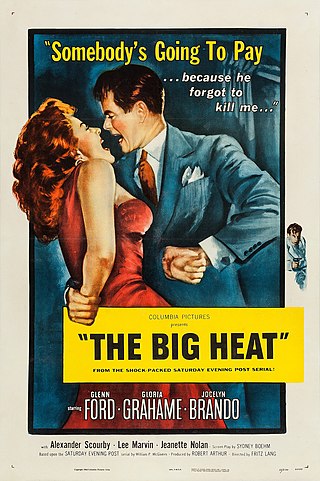
The Big Heat is a 1953 American film noir crime film directed by Fritz Lang starring Glenn Ford, Gloria Grahame, and Jocelyn Brando about a cop who takes on the crime syndicate that controls his city.
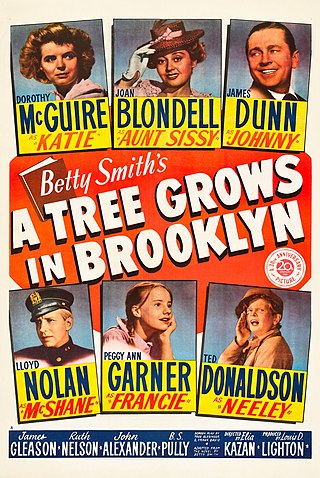
A Tree Grows in Brooklyn is a 1945 American drama film that marked the debut of Elia Kazan as a dramatic film director. Adapted by Tess Slesinger and Frank Davis from the 1943 novel by Betty Smith, the film focuses on an impoverished but aspirational, second-generation Irish-American family living in the Williamsburg neighborhood of Brooklyn, New York, in the early 20th century. Peggy Ann Garner received the Academy Juvenile Award for her performance as Francie Nolan, the adolescent girl at the center of the coming-of-age story. Other stars are Dorothy McGuire, Joan Blondell, Lloyd Nolan, Ted Donaldson, and James Dunn, who received the Academy Award for Best Supporting Actor for his portrayal of Francie's father.
The 1st New York Film Critics Circle Awards, announced on 2 January 1936, presented March 2, 1936, honored the best filmmaking of 1935.
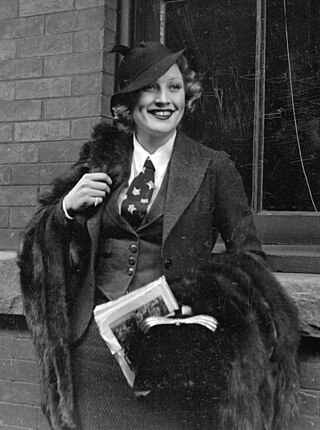
Margot Grahame was an English actress most noted for starring in The Informer (1935) and The Three Musketeers (1935). She started acting in 1930 and made her last screen appearance in 1958.

Hangman's House is a 1928 romantic drama genre silent film set in County Wicklow, Ireland, directed by John Ford (uncredited) with inter-titles written by Malcolm Stuart Boylan. It is based on a novel by Brian Oswald Donn-Byrne. It was adapted by Philip Klein with scenarios by Marion Orth. The film is also notable for containing the first confirmed appearance by John Wayne in a John Ford film.
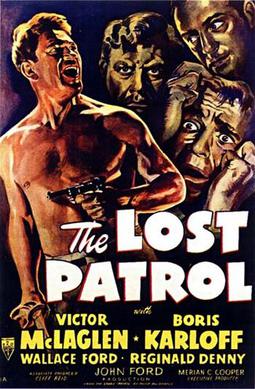
The Lost Patrol is a 1934 American pre-Code war film by RKO, directed and produced by John Ford, with Merian C. Cooper as executive producer and Cliff Reid as associate producer from a screenplay by Dudley Nichols from the 1927 novel Patrol by Philip MacDonald. Max Steiner provided the Oscar-nominated score. The film, a remake of a 1929 British silent film, starred Victor McLaglen, Boris Karloff, Wallace Ford, Reginald Denny, J. M. Kerrigan and Alan Hale.

Denis O'Dea was an Irish stage and film actor.

John Ford (1894–1973) was an American film director whose career spanned from 1913 to 1971. During this time he directed more than 140 films; however, nearly all of his silent films are lost. Born in Maine, Ford entered the filmmaking industry shortly after graduating from high school with the help of his older brother, Francis Ford, who had established himself as a leading man and director for Universal Studios. After working as an actor, assistant director, stuntman, and prop man – often for his brother – Universal gave Ford the opportunity to direct in 1917. Initially working in short films, he quickly moved into features, largely with Harry Carey as his star.

The Informer is a novel by Irish writer Liam O'Flaherty published in 1925. It received the 1925 James Tait Black Memorial Prize.
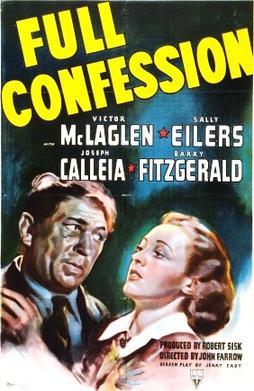
Full Confession is a 1939 United States proto film-noir, crime drama film made by RKO Radio Pictures. It was directed by John Farrow from an adaptation by Jerome Cady of Leo Birinski's story. The film stars Victor McLaglen, Sally Eilers, Barry Fitzgerald and Joseph Calleia.

The Informer is a 1929 British sound part-talkie drama film directed by Arthur Robison and starring Lya De Putti, Lars Hanson, Warwick Ward and Carl Harbord. The picture was based on the 1925 novel The Informer by Liam O'Flaherty. In the film, a man betrays his best friend, a member of the outlawed Irish Republican Army, to the authorities and is then pursued by the other members of the organisation. The later better-known adaptation The Informer (1935) was directed by John Ford.
Clifford McLaglen was a Stepney, London or Cape Town, Cape Colony - born film actor. He was one of nine or ten children and brother of several actors including Victor McLaglen, Oscar winner for best actor, The Informer, and nominated for best supporting actor The Quiet Man.

Jack Murray was an American film editor with about 55 feature film credits between 1929 and 1961. Fifteen of these films were with the director John Ford. Their credited collaborations commenced with The Prisoner of Shark Island (1936), which was produced when both men were working at the 20th Century Fox studio. It encompassed such well-known films as The Quiet Man (1952) and The Searchers (1956), and ended only with Murray's death in 1961.
